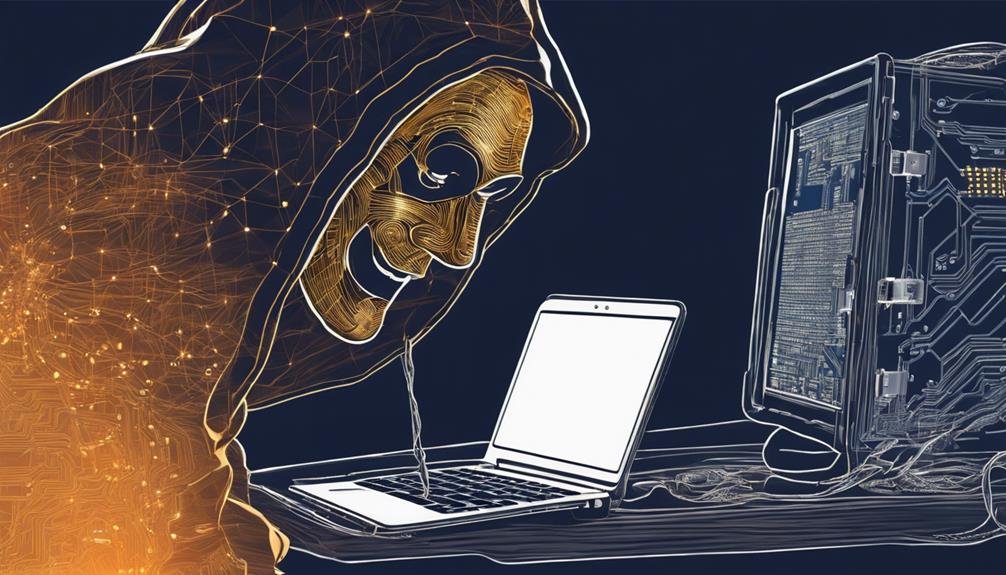Imagine discovering that your Bitcoin wallet has been compromised and your funds have been stolen. How did this happen? Bitcoin wallets are vulnerable to theft due to weak encryption methods, susceptibility to phishing attacks, and the risk of malware infecting your devices. But why are these vulnerabilities present in the first place, and what can you do to protect your digital assets from falling into the wrong hands?
Table of Contents
Key Takeaways on Why Are Bitcoin Wallets Vulnerable to Theft?
- Insecure storage methods and software weaknesses create vulnerabilities.
- Neglecting private key safeguarding leads to theft susceptibility.
- Online transactions pose risks due to hacker targeting and lack of recourse.
- Implementing multi-signature authentication enhances security against unauthorized transfers.
Common Bitcoin Wallet Vulnerabilities

Common Bitcoin wallet vulnerabilities stem from insecure storage methods, exploitable software weaknesses, and human error. The security of Bitcoin wallets relies heavily on protecting private keys, which are essential for authorizing transactions on the blockchain. Failure to safeguard these private keys can result in security vulnerabilities that make wallets susceptible to theft. Insecure storage methods, such as keeping private keys in easily accessible locations, increase the risk of unauthorized access.
Additionally, hackers can exploit wallet software vulnerabilities to compromise private key security. Regular software updates are important for patching known security flaws and protecting against emerging threats. Refrain from updating wallet software to avoid exploitation by malicious actors seeking to steal private key information.
Phishing attacks pose a significant threat to Bitcoin wallet security. These attacks trick users into disclosing their private key information through deceptive means. Proper password management practices and user vigilance are essential to mitigate the risk of falling victim to phishing attempts and compromising the security of Bitcoin wallets.
Importance of Secure Private Keys

Secure private keys are the foundational gatekeepers to accessing and managing cryptocurrency assets, ensuring the protection and integrity of your digital wealth. These highly encrypted data strings are critical for maintaining the security of your assets. Here are some key points to emphasize the importance of secure private keys:
- Irreversible Loss: Losing control of your private keys can result in irreversible loss of your digital assets, highlighting the critical nature of safeguarding them.
- Unauthorized Access: Compromised private keys can lead to unauthorized access to your wallets, risking your cryptocurrency assets.
- Preventing Theft: Keeping your private keys secure is essential to prevent theft and unauthorized transactions, safeguarding your wealth.
- Encryption: Private keys are the ultimate encryption method for protecting your cryptocurrency assets, underscoring their significance in maintaining security.
Maintaining the security of your private keys is paramount in ensuring the safety of your digital assets and preventing potential theft.
Risks Associated With Online Transactions

Engaging in online transactions involving Bitcoin wallets, hacking attempts, and phishing attacks is vital to safeguarding your digital assets. The nature of online transactions makes Bitcoin wallets susceptible to cryptocurrency theft, as hackers target these digital wallets to gain unauthorized access and steal funds.
Since no centralized authority oversees Bitcoin transactions, users face limited recourse in case of theft from their online wallets. The vulnerability lies in storing private keys as digital files within these wallets, making them prime targets for cybercriminals.
Decentralized crypto exchanges, lacking the power to resolve disputes or recover funds in the event of scams, further exacerbate the risks associated with online transactions. Users must take responsibility for implementing robust security practices to protect their online transactions and mitigate the potential for theft or unauthorized access to their digital assets.
Safeguarding Against Phishing Attacks

Understanding and implementing effective strategies to counter phishing attacks is imperative to fortify your defenses against potential threats in online transactions, especially concerning Bitcoin wallets. Phishing attacks target Bitcoin wallet users by tricking them into revealing private keys, which can lead to unauthorized access and the loss of cryptocurrency assets. To protect your wallet, consider the following:
- Implement Two-Factor Authentication: Adding an extra layer of security can prevent unauthorized access even if your login credentials are compromised.
- Avoid Clicking on Suspicious Links: Be cautious of emails or messages with links that ask for sensitive information; always verify the sender’s authenticity.
- Educate Yourself on Common Phishing Techniques: Understanding how scammers operate can help you recognize and avoid potential threats.
- Verify Communication Authenticity: Before sharing any information, confirm the legitimacy of the source to prevent falling victim to phishing attempts.
Implementing Multi-Signature Authentication

To enhance your Bitcoin wallet’s security, multi-signature authentication requires the approval of multiple private keys for transactions. This method greatly boosts security by necessitating the agreement of all key holders before any transaction can be executed, reducing the risk of unauthorized transfers. Implementing multi-signature authentication adds an additional layer of protection, making it harder for malicious actors to access your digital assets.
Businesses, exchanges, and high-net-worth individuals commonly utilize multi-signature wallets. They offer increased resilience against single points of failure and external attacks, making them a preferred choice for securing valuable digital assets. Using multiple private keys guarantees that no single key can authorize a transaction independently, enhancing the overall security posture of crypto wallets.
With multi-signature authentication, you can trust that your digital assets are better safeguarded against potential threats and unauthorized access attempts.
Frequently Asked Questions
Can Someone Steal My Bitcoin if They Have My Wallet Address?
If someone has your wallet address, they can’t steal your Bitcoin. Security concerns arise from exposing private keys, falling for phishing scams, or being targeted by social engineering. Safeguard your private keys and seed phrases.
Why Do Crypto Wallets Get Hacked?
To keep your crypto safe, understand how hackers exploit security flaws. Implement robust security measures, guard private keys diligently, be wary of online threats like phishing and social engineering, and consider using hardware wallets for added protection.
How Common Is Bitcoin Theft?
Bitcoin theft is prevalent, impacting users worldwide. Prevention methods, like two-factor authentication, enhance security. Recovery processes are complex due to decentralized platforms. Understanding common tactics is essential to safeguarding your assets.
What Is the Vulnerability of a Bitcoin Transaction?
When considering the vulnerability of a Bitcoin transaction, privacy concerns arise due to the sole reliance on private keys. Security measures like wallet encryption are essential to safeguard against unauthorized access and theft.
Conclusion
Bitcoin wallets are vulnerable to theft due to key generation flaws and lack of entropy. While some argue that implementing strong encryption and regularly monitoring transactions can be time-consuming, the risk of theft in the cryptocurrency space necessitates these security measures.
By addressing common vulnerabilities and staying vigilant against potential threats, users can better protect their assets and minimize the theft risk in their Bitcoin wallets.



